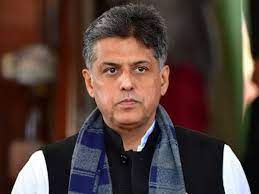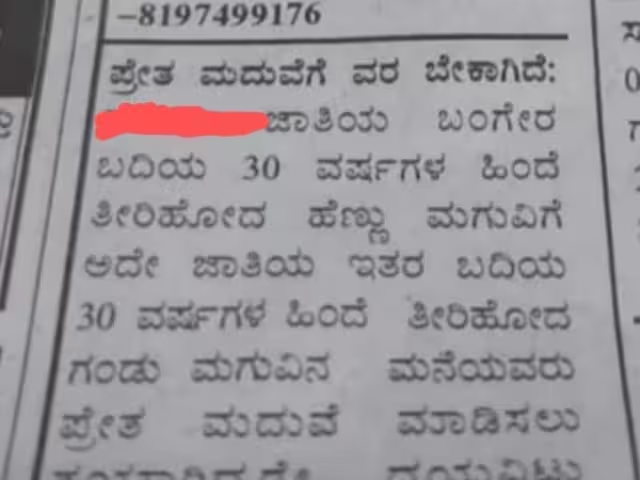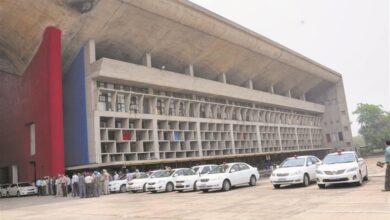Cong’s Manish Tewari: “All Bills Passed After Admission Of No-Trust Motion Constitutionally Suspect”
Manish Tewari, a congressman from the Congress party, declared on Sunday that any legislation approved after the no-confidence motion in the Lok Sabha was allowed is “constitutionally suspect” and that any meaningful legislative work must follow the conclusion of the motion, not come before it.
A 10-day window for arranging a debate on the no-confidence resolution introduced in the Lok Sabha, according to the former Union minister, cannot be exploited to “steamroll” legislation.
The Lok Sabha MP made this statement as the House prepared to discuss the measure that will replace the Delhi services legislation this week.
Tewari said in an interview with PTI that any legislation or important business presented before the House is “completely in violation of morality, propriety, and parliamentary conventions” after the no-confidence motion has been filed in the Lok Sabha.
He said that any laws enacted in the Lok Sabha or Rajya Sabha after the admission of the no-confidence motion would have to be adjudicated by a court of law as to whether they were lawfully approved or not.
He said that any legislative activity that took place after the no-confidence motion was filed is “constitutionally suspect.”
Tewari responded to the BJP’s comparison of the present situation to the 2018 no-confidence vote against the Narendra Modi administration and the overwhelming support it received in the 2019 elections by saying, “If history repeats itself once, it is a tragedy and if it does so twice, it is a farce.”
In the midst of coordinated attempts by the anti-BJP group to push Prime Minister Narendra Modi to address the divisive Manipur issue in Parliament, a no-confidence resolution brought out by the Congress on behalf of the opposition coalition INDIA against the government was allowed in the Lok Sabha on Wednesday.
When asked about the Indian National Developmental Inclusive Alliance (INDIA) bloc’s numbers not adding up for the vote of no confidence, Tewari said that it was a moral issue rather than a numerical one.
“What has occurred in Manipur and what is happening there is just abhorrent. There is a BJP government in both the state and the federal government. As a result, someone must assume accountability, Tewari said PTI.
He said that the opposition had anticipated that the prime minister would speak spontaneously about the “extremely critical situation” in Manipur in both Houses of Parliament, followed by a debate.
However, regrettably, the prime minister decided to make a rather “cursory remark” shortly before the Monsoon session started. The Congress leader said that after it, the presiding officers frequently refused to allow adjournment motions that were presented in both Houses of Parliament.
In order to impose the idea of morality, probity, and responsibility in public life, which must be the sine qua non of any administration, the combined opposition was therefore left with no choice but to introduce this no-confidence resolution, he said.
When asked what was expected of Prime Minister Modi’s response to the motion of no-confidence, Tewari stated that the motion states that “this house expresses want of confidence in the council of ministers” and that the justification for that lack of confidence has been publicly stated “ad nauseum” for the past week.
“So under those circumstances, if the prime minister chooses not to respond to Manipur, it would be a travesty,” the MP from Punjab’s Anandpur Sahib added.
In response to the BJP’s claim that ministers, not the prime minister, responded to previous incidents of violence in the northeast, Tewari claimed the Modi administration could have approved adjournment petitions offered by opposition MPs.
“We had been submitting applications for postponement daily. The motions for adjournment that can be answered by a minister might have been approved by the government. They were rejected by the government, he said.
Tewari questioned, “Under these circumstances, what was the hesitation and diffidence in coming and addressing Parliament on the same issue if the prime minister could speak outside of Parliament and say that the developments in Manipur have made our heads hang in collective shame.”
When asked if the replacement bill for the Delhi services ordinance should be introduced after the no-confidence motion is discussed and decided, Tewari responded, “Even (the book by) MN Kaul and SL Shakdher, which I had quoted, is explicit that once the no-confidence motion is accepted by the Speaker, no other business should be given precedence.”
Tewari remembered that in July 1966, when a no-confidence motion was submitted against the government, Satyendra Narayan Sinha, the minister for parliamentary affairs at the time, had agreed that no other significant work should be conducted while the issue was before the House.
When asked why the opposition insisted on discussing the no-confidence motion right away even though the rules call for a 10-day scheduling window, Tewari responded that it was for the straightforward reason that when there is a lack of confidence in the council of ministers, where does the government get the authority to introduce laws and get them approved by the House?
“Those 10 days are there because if the presiding officer in his wisdom wants to adjourn the House and take it up at a later point in time within 10 days, that flexibility has been given to the presiding officer to schedule the vote of confidence,” he said. The Congress leader said that it cannot be used to “steamroll” legislation or important policy issues through the House without debate.
Tewari responded that the INDIA alliance would have to decide whether or not to participate in the debate if the bill to replace the Delhi ordinance is taken up for consideration before the no-confidence motion or if they will oppose its introduction and boycott it until the motion is taken up.
The legislation is seen as a “serious assault on federalism” in general, he said.
The Congress MP added, “In my opinion, every law, no matter how significant or unimportant, should come after the result of a motion of no confidence rather than come before it.”
Regarding the trend toward disruption rather than debate, Tewari said that although disruption is an acceptable parliamentary strategy, it is the government’s job to rule Parliament.
He said that Arun Jaitely of the BJP, who was then the leader of the opposition in the Lok Sabha, was the one who first developed the theory that disruption is an acceptable legislative strategy.
Tewari said that after a vote of no-confidence has been brought before the House, it is ultimately up to the various parties to express their grievances, “but obviously Manipur is the overriding priority on everyone’s mind” and that is why an all-party team has visited the state.







